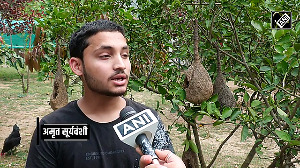The United States Department of State on Wednesday defended its travel warning for India, arguing that there is a propensity for terrorism during the Diwali season, and that this is a concern that New Delhi itself had acknowledged going from past experience.
Asked if the department had any credible accounts about potential terrorist attacks inside of India, spokesman Mark Toner said, "Let me just say that we do alert US citizens of the continued possibility of terrorist attacks throughout India during the holiday season, which includes Hindu, Islamic, and other religious and secular holidays between October and January."
Toner said, "The travel alert expires on January 20 next year." He added, "Recent Indian government advisories and local media report increased indications that there are terrorist attacks possibly in planning."
"This is in addition to the current standing travel alert, but we also note that this period has been a period in the past where there have been terrorist attacks, and then there are upcoming anniversaries of such attacks in India," he said.
Toner added, "It's really just an effort on our part to do due diligence and to alert folks of the heightened so that they're more aware of the possibility."
In its updated travel advisory issued on October 18, the department said, "Recent Indian government advisories and local media reports increased indications that terrorists are planning attacks in India. In the past, terrorists have targetted markets, public transportation, religious sites, hotels and restaurants."
"During the November 2008 attacks in Mumbai, terrorists specifically targetted hotels and other public places," the warning added.
"Attacks have taken place during the busy evening hours in markets and other crowded places, but could occur at any time," and pointed out that "on July13, 2011, three explosions occurred in crowded areas around Mumbai, killing 21 people and injuring more than 100."
"In December 2010 an explosive device that detonated at Shitla Ghat in Varanasi during evening 'aarti', or prayers, killed two persons and injured 30, including several foreigners.
It said. "In February 2010, an explosive device detonated at a café in Pune, Maharashtra and killed 10 people, including two foreign nationals, and injured 50."
The backgrounder continued how, "Beginning in May 2008, several coordinated terrorist attacks occurred in major cities throughout India, to include New Delhi, culminating in the November attacks in Mumbai where over 170 people were killed, including six US citizens."
The warning said that "US citizens traveling or residing in India are always urged to maintain a heightened situational awareness and a low profile, monitor local news reports, consider the level of security present when visiting public places, and take appropriate steps to bolster their personal security."
Meanwhile, in a backgrounder on India in the section subtitled Threats to Safety and Security, the department said, "India continues to experience terrorist and insurgent activities which may affect US citizens directly or indirectly."
It pointed out that "Anti-Western terrorist groups, some on the US government's list of foreign terrorist organisations, are active in India, including Islamist extremist groups such as Harakat ul-Mujahidin, Jaish-e-Mohammed, Lashkar-e Tayiba, and Harkat-ul-Jihad-i-Islami."
The department said, "The US government continues to receive information that terrorist groups are planning attacks that could take place in locations throughout India. India is also faced with several ongoing insurgencies, the most dangerous of which has been the insurgency of Maoist extremist groups, also known as Naxalites, waged against the Indian government."
It said, "Though not directed specifically at Westerners, the violence frequently occurs in densely-populated or high-traffic areas for maximum impact: areas in which US citizens may inadvertently find themselves caught up in the violence."









 © 2025
© 2025